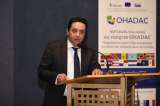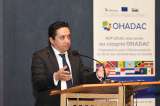 The OHADAC Congress, which took place on 21 and 22 September 2015 in Pointe-à-Pitre, Guadeloupe, held a workshop dedicated to “OHADAC arbitration”, in preparation for the creation of the OHADAC Centre of Arbitration between now and the end of 2016, whose headquarters will be located in Guadeloupe.
The OHADAC Congress, which took place on 21 and 22 September 2015 in Pointe-à-Pitre, Guadeloupe, held a workshop dedicated to “OHADAC arbitration”, in preparation for the creation of the OHADAC Centre of Arbitration between now and the end of 2016, whose headquarters will be located in Guadeloupe.
On this occasion, texts were presented relating to “OHADAC arbitration” that had been written by the team of academics and researchers under the direction of Professor Rodolfo Dávalos Fernández.
The panel was chaired by:
- Elma Gene Isaac, Coordinator of the Regional Integration Unit of the Organisation of Eastern Caribbean States, the OECS, Saint Lucia.
And brought together the following speakers:
- Rodolfo Dávalos Fernández, Professor of Law at the Alma Mater University of Havana, President of the Cuban Arbitration Court, Cuba,
- José Carlos Fernández Rozas, Professor of Law at the Complutense University of Madrid, International Arbitrator, Spain,
- Francisco Victoria Andreu, International Arbitrator, Vice-President of the Andrés Bello Association of Franco-Latino-American Jurists, Mexico/France,
- Narciso Cobo Roura, International Arbitrator, Professor at the Alma Mater University of Havana, Vice-President of the Cuban Arbitration Court, Cuba,
- Narcisse Aka, Secretary General of the Arbitration Centre of the Common Court of Justice and Arbitration, the CCJA OHADA, International Arbitrator, Ivory Coast.
 In her opening speech, the chair Elma Gene Isaac reminded us that regional and international agreements should favour economic activities and that arbitration structures are therefore increasingly important.
In her opening speech, the chair Elma Gene Isaac reminded us that regional and international agreements should favour economic activities and that arbitration structures are therefore increasingly important.
Professor Rodolfo Davalos Fernandez introduced “OHADAC arbitration” and reminded us that, although the OHADAC was simply a vehicle for dreams in 2007, today it has become a reality. He explained that the work carried out on OHADAC arbitration takes into account the laws relating to international arbitration in 36 of the 39 territories of the Greater Caribbean Region, a region that, although heterogeneous, is made up of members with common interests. He added that the analysis of the regulations, methods, and procedures of institutions has also helped create a Lex mercatoria area of arbitration that can be used for specific situations.
He analysed the “purpose of OHADAC arbitration”, stating that:
- arbitration is an objective but also a natural, logical, historical, necessary and desired link between, on the one hand, the Caribbean region and its efforts for integration and, on the other, the OHADAC project, due to the need to ensure the security of international transactions in the region,
- it is no coincidence that, since its creation, some of the principle objectives of the OHADAC have been the creation of an International Commercial Arbitration Centre and the provision of a legal framework for the adoption of OHADAC international rules of arbitration adapted to the specific characteristics of the Caribbean, bearing in mind that, although the OHADAC Model Law contributes to internal arbitration, it must nonetheless have international scope.
 Professor Davalos Fernandez explained that the aim of the project is to design international commercial arbitration that provides economic operators with more benefits, such as independence of the arbitrator, efficacy of the arbitration tribunal, popularization of arbitration by its contribution to the training of local experts, etc., and in this, the adoption of ad hoc OHADAC rules of arbitration aims at providing traders, lawyers, teachers, systems for legal practice and the world of international business in the Caribbean region an appropriate instrument for using international commercial arbitration as an alternative form of dispute resolution.
Professor Davalos Fernandez explained that the aim of the project is to design international commercial arbitration that provides economic operators with more benefits, such as independence of the arbitrator, efficacy of the arbitration tribunal, popularization of arbitration by its contribution to the training of local experts, etc., and in this, the adoption of ad hoc OHADAC rules of arbitration aims at providing traders, lawyers, teachers, systems for legal practice and the world of international business in the Caribbean region an appropriate instrument for using international commercial arbitration as an alternative form of dispute resolution.
He reminded us that an arbitration system cannot be based solely on the interests of the parties, as effective arbitration requires simple procedures and arbitrators with proven qualifications, pointing out that the OHADAC arbitration project was not limited to the presentation of ad hoc rules of arbitration and also envisages the creation of a Caribbean Centre of Arbitration, whose function will be to promote arbitration, raise awareness of the OHADAC rules of arbitration, contribute to the training of arbitrators and mediators in the Caribbean and to serve as an appointing authority in ad hoc arbitration procedures carried out in application of the OHADAC rules.
He finished by highlighting the fact that the OHADAC arbitration project will strengthen the area of collaboration between Caribbean territories, giving the region its own arbitration solutions and thus responding to the legitimate aspirations of economic operators in the Caribbean.
Professor José Carlos Fernandez Rozas then spoke on the subject of: “The characteristic functions of an arbitration centre”. He stated that universalism and regionalism are at the heart of discussions guiding the creation of arbitration models and reminded us that the inherent values of arbitration centres are permanence, regularity, and professionalism, reminding us that they are not created for specific arbitration and that they must perform their duties with a level of professionalism which must be shown in its:
- knowledge of the arbitration rules issued by the Centre itself as well as those of the country where it develops its activity prima facie,
- supervision of the arbitration agreement and the procedural activity of the arbitrator.
 He added that the arbitration centre has an obligation to diligently administer arbitration decisions after verifying their competence and that the rejection of a request for arbitration without just cause may be subject to appeal and lead to tortious liability for any damage caused.
He added that the arbitration centre has an obligation to diligently administer arbitration decisions after verifying their competence and that the rejection of a request for arbitration without just cause may be subject to appeal and lead to tortious liability for any damage caused.
Professor Fernandez Rozas made the distinction between institutional arbitration and ad hoc arbitration. He pointed out that in institutional arbitration, the participation by an entity administering and organizing the procedure is fixed. It provides a certain number of services enabling the most effective resolution of the conflict, and the contentious issue is resolved by the arbitrators chosen (in principle) by the parties. He reminded us that, as a general rule, arbitration centres have a list of arbitrators, rules of procedure and various model arbitration agreements, which makes it easier for parties to agree to the arbitration. Finally, he emphasized that the one of the main advantages of institutional arbitration over ad hoc arbitration is that the content of the arbitration agreement is simplified, which prevents the propagation of so-called “pathological” clauses.
He added that arbitration institutions work with pre-established rules and procedures that have been perfected through experience. A simple reference to the rules of the institution is often enough, and the parties don't have to agree on the details of the procedure. He pointed out however that when this is not the case, the arbitration agreement must contain a series of explanations that are difficult to predict when writing the arbitration clause.
Before finishing, he marked out the differences between bodies whose role is limited to designating arbitrators (appointing authorities) and those which play a genuine administrative role (a tutelary role) of varying scope, throughout the arbitration process, even going as far as being involved in the writing, without actually having a say in, it goes without saying, the content of the decisions.
Discussing the situation in the Caribbean, José Fernandez Rozas explained that the Model Law of Arbitration of 1995 has not been followed by all states in the OHADAC geographic area, which means that, although French law distinguishes between domestic arbitration and international arbitration, many countries in the Caribbean ignore this model. The professor concluded by explaining that harmonization still had a lot to offer, and that international arbitration should be considered an important subject in the Caribbean, as we live in an undeniably globalized world.
Francisco Victoria Andreu brought the Congress' attention to the “Report of the Andrés Bello Association of Franco-Latino-American Jurists on the ad hoc arbitration rules project and the Caribbean Centre of Arbitration”.
In his introductory remarks, Francisco Victoria Andreu reminded us that the world today is increasingly global, that borders are disappearing and at the same time doors to international commerce are opening. New players are emerging and developing. In this context, security must be ensured at all levels for faster, more cost-effective dispute resolution that better respects the independent will of parties but which also guarantees equality and fairness. He emphasized that because of this, arbitration is the best way to resolve disputes as it guarantees the necessary legal certainty, and as it represents a genuine driver for economic development in a region.
Referring to the Caribbean Centre of Arbitration, he concluded that the creation of such a centre would be extremely pertinent for Caribbean economic activity and that it would set a special example for Latin American countries, even more so as the Greater Caribbean Region counts over 260 million people all immersed in different legal cultures. The aim of the OHADAC arbitration project fits perfectly into the socio-economic reality of the region, understanding its needs and offering interesting alternatives that ensure access to more neutral justice. Thanks to this project, particularly important aspects of the arbitration procedure in the Caribbean setting, indeed in the Latin-American setting, can be solved by offering an institutional alternative for those involved in international commerce.
 He added that one of the fundamental issues remains the choice of headquarters and that the city of Pointe-à-Pitre in Guadeloupe has certain legal significance and implies the security of the arbitration procedure as, because it is located on French soil, the city is part of a state with a long tradition of arbitration.
He added that one of the fundamental issues remains the choice of headquarters and that the city of Pointe-à-Pitre in Guadeloupe has certain legal significance and implies the security of the arbitration procedure as, because it is located on French soil, the city is part of a state with a long tradition of arbitration.
Regarding the rules of arbitration (which may be inspired by other rules), Francisco Victoria Andreu discussed the possibility of choosing between ad hoc arbitration and institutional arbitration, with the main difficulty encountered when establishing applicable law is the way in which parties opt for one or the other.
He noted that:
- the rules are presented in a superficial manner in terms of third-party intervention,
- it is worth taking into account the impact of arbitration when considering investment,
- the Terms of Reference must include timescales and intervention costs.
Narciso Cobo Roura then presented “The OHADAC project for international commercial arbitration”. Narciso Cobo Roura opened with three quotations:
- “Even the unexpected ends up becoming tradition”,
- “Close the curtains, do not light the light”,
- “Crisis is a sign that it is time to rethink the tools”.
 He explained that the OHADAC rules of arbitration project present multiple advantages, particularly in its scheduling, which is in keeping with the spirit of the UNCITRAL Arbitration Rules of 2010, making it possible to follow every step of the “construction” of the arbitration procedure. He also hailed its clear writing and language (avoiding as far as possible polysemous and difficult-to-understand terms), taking into account the different languages used in Caribbean island countries. He explained that the OHADAC rules of arbitration project is the result of the harmonization of disputes, a form of syncretism in the field of arbitration.
He explained that the OHADAC rules of arbitration project present multiple advantages, particularly in its scheduling, which is in keeping with the spirit of the UNCITRAL Arbitration Rules of 2010, making it possible to follow every step of the “construction” of the arbitration procedure. He also hailed its clear writing and language (avoiding as far as possible polysemous and difficult-to-understand terms), taking into account the different languages used in Caribbean island countries. He explained that the OHADAC rules of arbitration project is the result of the harmonization of disputes, a form of syncretism in the field of arbitration.
He mentioned two innovations that should be announced and drew particular attention to:
- its singular aim of governing the two types of arbitration indistinctly - whether ad hoc arbitration or institutional arbitration,
- the fact of envisaging - in both cases - the use of the Terms of Reference, drawn from this other essential reference - the ICC Rules of Arbitration.
 He added that the intention to create an arbitration centre and not a court showed that the goal was not to go beyond harmonization. The centre's aim is to facilitate communication between parties, to establish their objectives and the amount of compensation for damages.
He added that the intention to create an arbitration centre and not a court showed that the goal was not to go beyond harmonization. The centre's aim is to facilitate communication between parties, to establish their objectives and the amount of compensation for damages.
Narciso Cobo Roura underlined the importance of the Terms of Reference and the advantages they bring, namely in:
- determining the issues the court must decide on,
- limiting the introduction of new requests, without preventing the presentation of a new argument, even if parties cannot change their objectives as they wish,
- encouraging communication between the parties to reach a conciliatory solution,
- correcting any defects in the arbitration agreement.
The workshop dedicated to arbitration was brought to a close with a speech from Narcisse Aka. He spoke on the subject of: “The OHADA Common Court of Justice and Arbitration - the OHADA CCJA: a regional centre of arbitration”.
Narcisse Aka reminded us that the OHADA is composed of 17 states representing a third of the African continent and can easily be defined as a space for legal and judicial integration, even more so as it is emphasized in the introduction and first article of the founding treaty that the OHADA, the Organization for the Harmonisation of Business Law in Africa, aims to “promote arbitration as an instrument for contract dispute resolution”.
He pointed out that the Common Court of Justice and Arbitration has three roles: a judicial role, an advisory role, and an arbitration role. It is unique in the world, as nowhere else does an arbitration centre exist within a supreme judicial body. He added that the recourse to arbitration for dispute resolution was defended originally by the founding fathers of the OHADA and that ever since an arbitration agreement has existed there, the Court has been competent.
 In terms of procedure, he pointed out that it is impossible to have more than three arbitrators, that there is a list of 200 arbitrators, from both within and outside the OHADA zone, from which the parties can (though are not obliged to) choose the arbitrators, and that the parties can choose the arbitration headquarters located within or outside the OHADA zone.
In terms of procedure, he pointed out that it is impossible to have more than three arbitrators, that there is a list of 200 arbitrators, from both within and outside the OHADA zone, from which the parties can (though are not obliged to) choose the arbitrators, and that the parties can choose the arbitration headquarters located within or outside the OHADA zone.
Regarding timescales, Narcisse Aka pointed out that the procedure is framed by strict deadlines, with the arbitration court having six months to complete trials and the option of taking provisional and protective measures, with the arbitration decision then benefiting from the exequatur in the 17 states of the OHADA zone.
He finished by talking about the partnership project with the International Chamber of Commerce and the existing partnerships with national centres.
There was then a lively discussion between speakers and participants in which numerous issues concerning arbitration were raised.
For further information, please contact:
Dr. Jean Alain Penda
Email: japenda@ohadac.com
Published on 2015-10-21, 9:34 am







